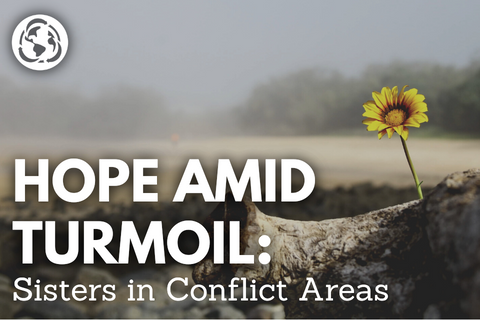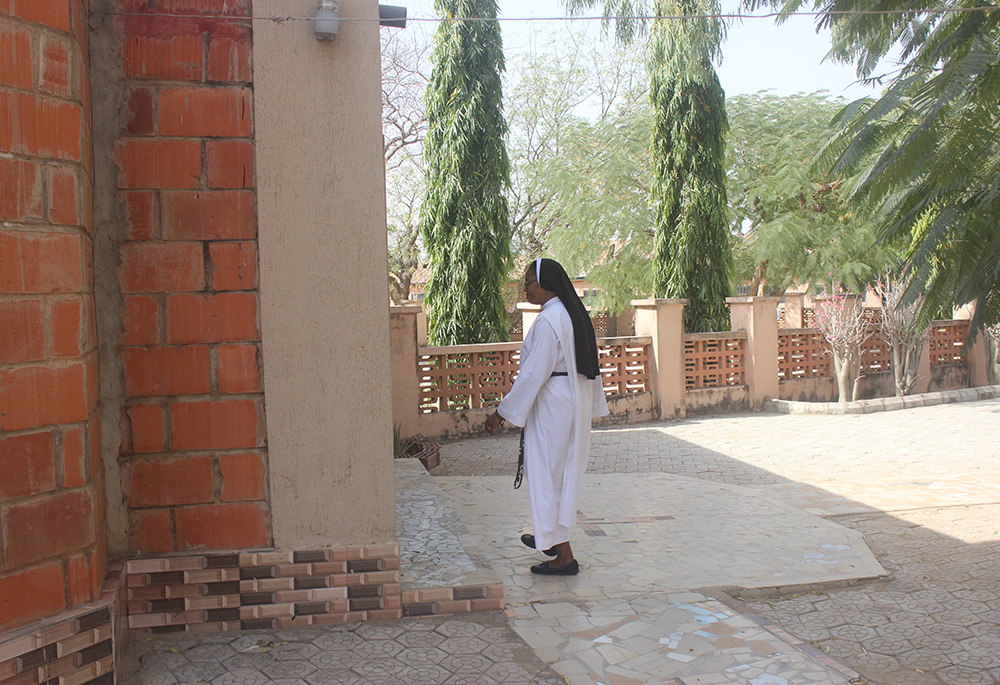Sr. Lydia Timkova of the Dominican Sisters of Blessed Imelda teaches a catechism class in Mukachevo, Ukraine, in February. Her students include new arrivals from other parts of Ukraine displaced during the war. The Dominican sisters are originally from neighboring Slovakia but have long experience in Mukachevo. Since the war's beginning, Timkova has traveled to eastern Ukraine at least three times to deliver humanitarian aid to areas hardest hit by the war. (Gregg Brekke)
On Feb. 23, Global Sisters Report published an inside look at sisters ministering in war-torn Ukraine as told by international correspondent Chris Herlinger along with compelling photos and video by experienced photojournalist Gregg Brekke.
This story launched one of GSR's most ambitious and far-reaching reporting series to date, Hope Amid Turmoil: Sisters in Conflict Areas, which looks at the lives and ministries of women religious serving in dangerous places worldwide. We've traveled to not only Ukraine, but to Nigeria and Kenya, and have had sister columnists and reporters write about Nicaragua, South Sudan and Haiti.
"Haiti is at war in all but name," wrote Herlinger in his latest report on the country's struggle with social disruption, gang violence, hunger and disease.

"This life is very miserable," Sr. Denise Desil, the mother general of the Little Sisters of St. Thérèse of the Child Jesus in Haiti, told Herlinger. "Oh, my goodness, it's not good."
This week, we wanted to pause midway through this special series to remind readers of the memorable stories and columns we've already published and call attention again to the extraordinary work of sisters in these conflict-embroiled regions. Throughout the series, we've shown how sisters work to help people resolve long-standing conflicts and foster peace, and we will be focusing more on this theme as the series continues through the end of the year.
In Nigeria, residents have seen growing cycles of attacks by armed gangs locally known as "bandits" who raid villages, rustle cattle, destroy farmlands and abduct locals for ransom.
"People who live here express shock and fear because of what is currently happening," Sr. Justina Nnajiofor told Patrick Egwu. "They would ask me what I am doing in a place where people are killed or abducted all the time."

Sr Justina Nnajiofor walks inside the chapel in their community on March 4. (Patrick Egwu)
Other sisters in Nigeria have turned their attention to helping internally displaced persons, or IDPs, who have fled terrorists in their hometowns, with sisters tending to their trauma and addictions as they live in those camps, reported Valentine Benjamin.
Sr. Dumka Michael, administrator and project officer, Sr. Bernadette Unamah, psychosocial counselor, and Sr. Theresa Agbam, health officer, visit the IDP camp three times a week to help people with medical and relief items, and to provide counseling to rebuild their resilience. The nuns also offer workshops to enroll the victims in different programs that teach them artisanal skills.
"The biggest challenge is getting people that will buy into our ideas and understand that it is not just about giving food items, and then they go home and remain the same," Michael told GSR. "We want to be able to help families by feeding them, sheltering them and providing them with sources of livelihood.
"On the other hand, you are giving them a sense of belonging that they are no lesser humans."
And sisters can be found in refugee camps all over Africa: As GSR Africa correspondent Doreen Ajiambo reported, sisters help foster peace between warring South Sudanese tribes who have suddenly found themselves as neighbors in Kenya's Kakuma Refugee Camp.
"Some of the refugees cry uncontrollably when they narrate their horrific experiences, but that's the way of healing and accepting themselves," said Franciscan Missionary of Mary Sr. Molly Lim, adding that some are taken to hospitals for professional assistance.
"We encourage refugees to forgive each other, show love to each other and live in peace as brothers and sisters."
In South Sudan, Sr. Scholasticah Nganda, ministers in a country rife with systemic injustices, exploitation, violence and natural disasters.
"As a missionary in South Sudan, I have learned to take in the pain of my people as they narrate their horrific stories, narratives that sometimes tore my heart," she wrote. "I have listened and heard women who have had to travel for days, hiding in bushes and surviving on grass and wild fruit as they made their way to what they imagined to be safe haven, either with relatives in distant villages or to church grounds."
Despite these stories of anguish and suffering, our goal for this series was to provide hope, to show our readers that despite conflict and strife, corruption and violence, women religious face challenges head on and overcome tremendous odds to continue their ministries.
Advertisement
As one Nicaraguan sister writes in her column:
We feel small and persecuted, but not abandoned by the God of Jesus who has his hands on the people and blesses and sustains us. Now is the time to learn to reinvent ourselves, and to contemplate our reality without comparisons or succumbing to pessimism, in order to continue weaving unity, fraternity and democracy with the threads of life.
Or in the Democratic Republic of Congo, where María de Lourdes López Munguía, a Franciscan Missionary of Mary, accompanies women survivors of sexual violence that comes with armed conflicts in the area.
"If today I would ask myself, how has this experience in Congo transformed me? — my first response is silence, a silence full of lives, names, stories; a silence that I find at dawn and that is a stubborn hope that does not allow death and war to win in the heart," she writes. "It is that same silence that is engendering a new way in my prayer, this letting myself be mothered by God, letting God cuddle me, allowing myself to cry in his arms so that I can later comfort and console his people."
Four years after suicide bomb attacks struck three churches and three hotels in Sri Lanka on Easter Sunday, sisters continue their healing ministry, accompanying survivors and the relatives of the 272 slain individuals, as Thomas Scaria reported for GSR.
A person mourns near the grave of a suicide bombing victim at Sellakanda Catholic cemetery April 23, 2019, in Negombo, Sri Lanka. (CNS/Reuters/Athit Perawongmetha)
Salvatorian Sr. Kanchana Silva Pulle, who handled two families who experienced loss that fateful April day in 2019, said the nuns initially experienced rejection from the distraught survivors, but "we walked with them in their crisis," at a time when survivors naturally felt "agitated and angry, frustrated and depressed." Winning the trust of those affected, Pulle said, "was a very tough time,” she told GSR.
But how do you build lasting peace in these beleaguered nations?
We want to continue telling these stories by turning our attention to peace initiatives and examine how sisters are building bridges and resolving conflicts at the grassroots level.
For example, our hope is for Herlinger to visit the Balkans in the fall and examine how, particularly in the light of the current Russia-Ukraine war, sisters in that region earlier helped lay the foundation for peace initiatives.
And as Colombia implements a peace accord, GSR Latin America regional correspondent Rhina Guidos intends to report on the role sisters are playing in encouraging peace between the country's warring factions, whether on an institutional or grassroots level.
Even though our Hope Amid Turmoil series will officially end in 2023, our commitment to telling the stories of sisters ministering in these war-torn countries will continue.
[Global Sisters Report international editor Soli Salgado and international correspondent Chris Herlinger contributed to this story.]





